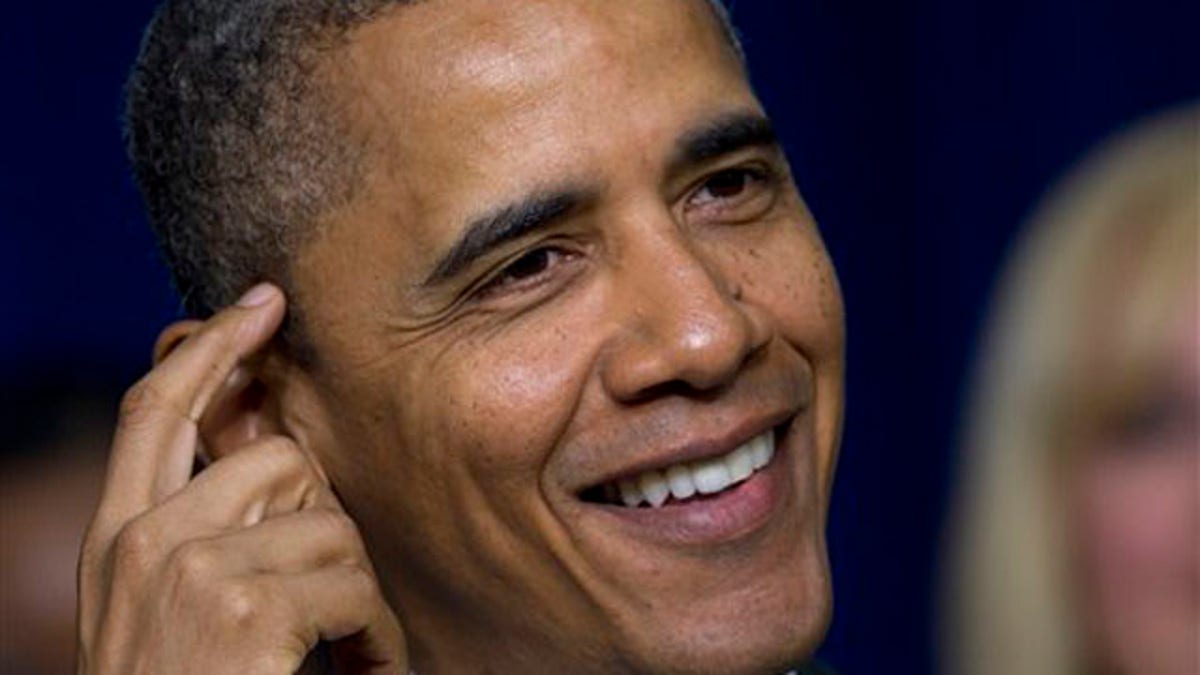
April 6, 2012: President Obama speaks at the White House. (AP)
For all the analysis of Mitt Romney's struggle to attract female voters, little has been made of the other gender gap -- President Obama's difficulty in attracting male voters.
While Romney's deficit among female voters is deeper, the incumbent president has faced his share of trouble winning over the other 49 percent of the population. The president's approval ratings since the beginning of his term demonstrate this reality. He fares consistently better among women, consistently worse among men.
When pitted against Romney, the Republican presidential front-runner, the trend holds. Romney often captures the men, while Obama wins the women.
In a Fox News Poll released last month, only 43 percent of men said they approved of the job Obama was doing -- 51 percent disapproved. The numbers practically flipped among women.
Drilling deeper into the numbers, the poll showed 59 percent of men disapproved of Obama's handling of the economy, compared with 50 percent of women who felt the same way. On the deficit, disapproval among men was 61 percent; among women, 53 percent.
A widely cited USA Today/Gallup poll last week, which measured Obama's and Romney's support in 12 vital swing states, showed Romney losing women 36-54 percent.
In the swing states, Obama was doing better among men than he has been nationally, but still behind by a point -- with Romney leading 48-47 percent.
The reason for each candidate's gender gap likely can be traced to a host of factors.
There are historical trends to consider -- women have favored Democrats and men Republicans for decades.
In this particular race, dissatisfaction with Obama runs deeper among men when it comes to issues of the economy and the deficit -- issues Romney has tried to make the centerpiece of his campaign platform.
Amid a shaky economy recovery, though, Obama's trouble with the not-so-fair sex could boil down to the basic challenge of unemployment.
"Men are hurting more in this workforce in unemployment than women are," said Brad Blakeman, past adviser to former President George W. Bush. "Men have left this president because they are unemployed."
The latest jobs report in March pegged the unemployment rate for men at 7.6 percent, for women at 7.4 percent. The numbers, though, weren't always so close.
The gap in the jobless rate for women and men grew to nearly 3 percentage points in late 2009 and has narrowed slowly since.
A 2010 report by the Federal Reserve Bank of New York found that the men fared worse during the recession and its aftermath in part because the industries that suffered most were male-dominated.
From a cultural perspective, Blakeman noted that the "burden of not being employed" can weigh more heavily on a man than a woman.
Polling has shown different issues mattering more to male and female voters.
In the USA Today/Gallup poll of swing state voters, men listed the deficit and national debt as their top issue. For women, the top issue was health care.
Indeed, Obama and his Democratic allies appear to have made inroads with women by stoking concerns about Republicans targeting contraception.
"The culture wars nonsense really drives -- especially women -- crazy," said Democratic strategist Peter Fenn. He said that while Obama should strive to bring more men on board with his campaign, Democrats historically don't need to be winning among men to win the presidential election.
Christopher C. Hull, who runs the online advocacy platform BlastRoots, said the gender gap has more to do with the nature of the parties than the candidates.
"The reality is that the party of the left is a generally communitarian party, and the party of the right is a generally individualist party," he said, calling those "feminine and masculine qualities, respectively."




